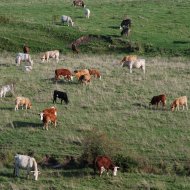New guide on identifying beef carcases

The new Eblex guide helps with identifying types of cattle, gender, age and conformations by studying carcases.
A new guide on to how to identify cows, bulls, steers and heifers of different ages and conformations aims to provide a useful training tool for anyone working in the beef industry.
The Identifying Beef Carcases educational guide from EBLEX - a division of the Agriculture and Horticulture Development Board - describes different breeds and types of cattle, details their uses in beef production and illustrates how to identify the sex and age of the animal as well as how to grade conformation by studying the carcase.
It explores the differences in muscle development, changes in bone structure due to the age of the animal, and fat and meat coloration and also contains two beef carcase classification charts.
One of these shows the typical classification for cow beef and the other features conformation standards for Quality Standard Mark (QSM) beef. It includes examples of good and poor conformation, with images and detailed descriptions showcasing acceptable industry standards.
Business development manager for EBLEX, Dick van Leeuwen, who produced the guide, said: “Identifying Beef Carcases is the latest in our series of knowledge transfer publications developed to help businesses improve their operational effectiveness.
"This guide combines the knowledge of EBLEX’s team of experts and it will enable businesses to educate and train the next generation of butchers and beef buyers.”
To order printed copies of the guide call the QSM Scheme Hotline on 0845 491 8787 or, to view online, visit www.eblextrade.co.uk.



 The veterinary mental health charity Vetlife is inviting the veterinary community to join it for a sponsored cold-water dip.
The veterinary mental health charity Vetlife is inviting the veterinary community to join it for a sponsored cold-water dip.